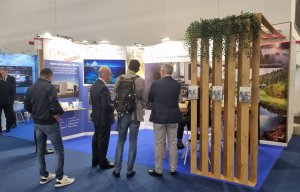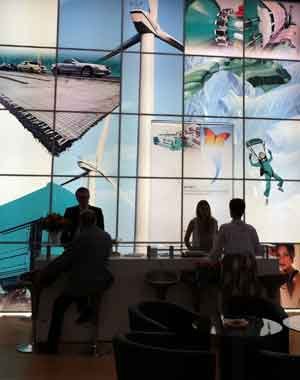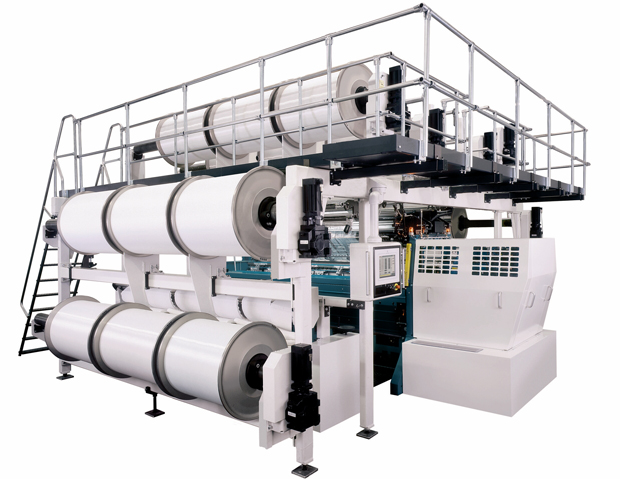
Techtextil success for FET
Karl Mayer will be presenting two new innovations at Techtextil 2013, which takes place from 11 to 13 June in Frankfurt. The German company’s Warp Knitting Business Unit has developed acoustic-damping warp-knitted spacer fabrics which will be integrated into its stand at the exhibition.

25th March 2013
Innovation in Textiles
|
Obertshausen
Karl Mayer will be presenting two new innovations at Techtextil 2013, which takes place from 11 to 13 June in Frankfurt. The German company’s Warp Knitting Business Unit has developed acoustic-damping warp-knitted spacer fabrics which will be integrated into its stand at the exhibition.
At ITMA 2011, the company successfully showed how warp knitted fabrics could be integrated into a stand to create maximum impact and using fabrics once again in the design of its stand at Techtextil 2013, the innovative machine builder has taken up the theme of functional interior design and produced acoustic room elements from 3D warp knitted fabrics.
Karl Mayer’s Technical Textiles Business Unit will also be showing a new sun-screening system, which is designed primarily for greenhouses but can also be used in the home. The solar fabric is marketed under the name of OMBRA-DLS.
OMBRA-DLS comprises an elastic, warp-knitted grid-like textile, which combines elastic warp yarns with slit-film yarns that are inserted from a magazine weft insertion unit. The openings in the mesh can be varied by stretching and relaxing the net, so that the amount of sun and thermal radiation can be adjusted as required. This new sun-screening solution provides consistent light diffusion and climate management.
With these two market-oriented textile innovations for providing acoustic insulation and sun protection, Karl Mayer says it is once again showing that it is an expert service-provider and project partner in the field of product development.
When developing new solutions and opening up applications that are not typical end-uses for textiles, Karl Mayer can support its customers by providing both advice and practical help. Specific projects have led to the development of market-ready products and hitherto undiscovered concepts that can be used by textile producers.
This spacer textile below with its acoustic properties is 35 mm thick. A monofilament yarn is used in the spacer layer and the outer surfaces are made from a textured yarn – a clever construction that provides effective sound absorption.
Whereas the upper and lower sides with their specific microscopic roughness reflect impinging sound waves effectively, the space between the two surfaces of the textile provides a dissipation zone to reduce the energy of the sound waves to a minimum.
The sound-damping textile was produced in conjunction with the Frauenhofer Institute for Building Physics (Frauenhofer Institut für Bauphysik), where Karl Mayer says, its functions were tested extensively.

“The tests proved to be very promising. Excellent drapability, a low weight, a variety of designs produced by printing technology and a pleasant textile handle – the typical advantages of warp-knitted spacer textiles compared to conventional interior design materials – round off the characteristics of this new sound-absorbing material,” Karl Mayer says.
“These innovative 3D textiles can offer all these functions, without having to carry out any special finishing processes. The noise-reducing constructions only have to be heat-set and stentered.”
The spacer fabrics are produced on Karl Mayer’s HighDistance machine, the HD 6 / 20-65 EL double-bar raschel machine which can produce warp-knitted spacer fabrics up to 60 mm thick. Both the surfaces and the spacer layer can be produced in a wide range of designs and the possibility of being able to incorporate pile-free tunnel zones, folds and application specific contours into the 3D fabric also offers interesting design possibilities.
Karl Mayer concludes that all the normal types of yarns can be used and that other advantages of the successful HighDistance machine include its efficiency and ease of operation.

Business intelligence for the fibre, textiles and apparel industries: technologies, innovations, markets, investments, trade policy, sourcing, strategy...
Find out more